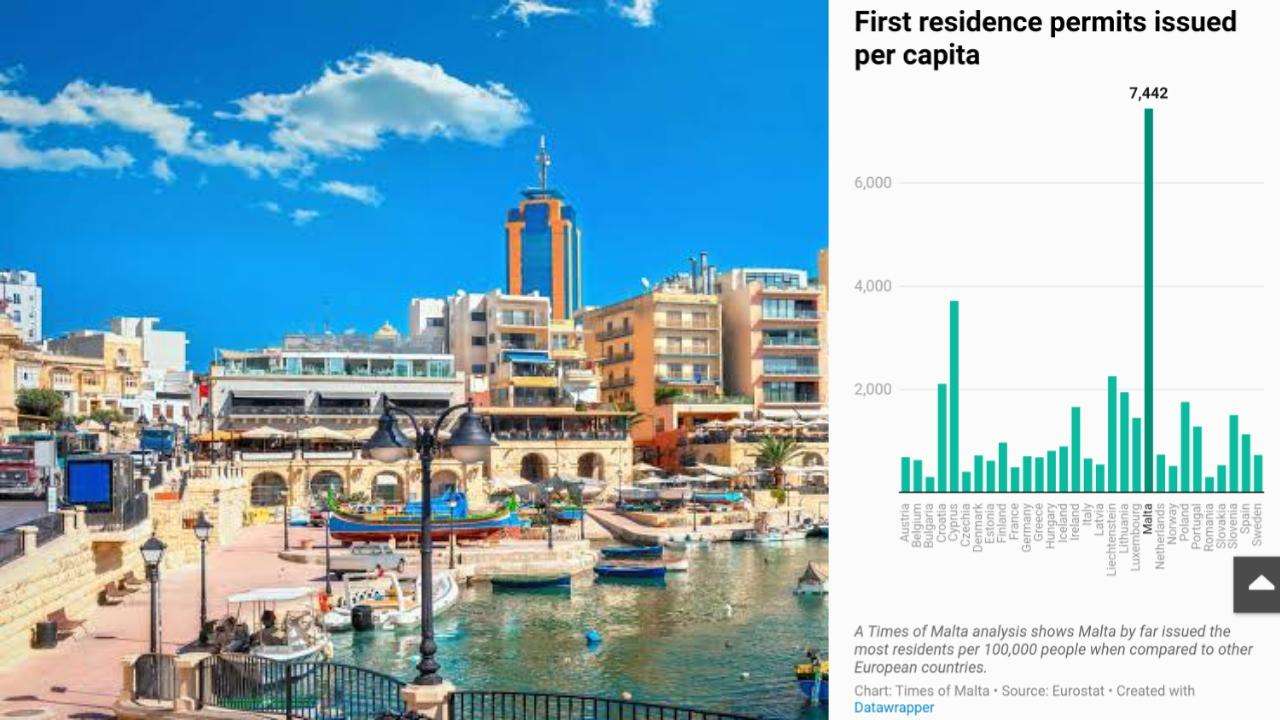An examination of European data reveals that Malta issued much more new residence permits per capita last year than any other nation in the EU.
Nearly 42,000 first-time resident permits were granted in Malta last year, according to data released this week by Eurostat.
While several nations issued far more—Germany, for instance, issued almost 586,000 residency permits—Malta stands out for issuing a disproportionately high number given its population size.
A Times of Malta analysis comparing the total number of new residence permits issued by each country to their population shows that per 100,000 people, Malta issued far more permits than anywhere else in the EU.
Malta issued more than 7,400 permits per 100,000 people, the analysis shows.
This was double the number granted by Cyprus (just over 3,700) – the second-highest country – and more than 11 times more than the 660 permits per 100,000 issued by Malta’s closest European neighbour Italy.
Eurostat data shows employment was the main driver of new residence permits, accounting for two-thirds (almost 28,000) of first permits issued in Malta – a trend mirrored across the continent.
“Employment remained the main reason for issuing residence permits in 2023, accounting for 33.8% (1.3 million) of all first residence permits issued,” Eurostat said.
Meanwhile, education accounted for almost 7,300 permits issued in Malta while family reasons accounted for almost 3,200.
In its recent release, the bloc’s statistics arm said more than 3.7 million first residence permits were issued in the EU to non-EU citizens last year, a 4.6% increase over the year before and the highest number to date.
The National Statistical Office (NSO) reports that the country's population reached over 563,000 last year. The data are released during a period of ongoing discussion concerning the country's reliance on foreign workers.
Prime Minister Robert Abela admitted in June that Malta's infrastructure and demography were under strain as a result of the country's "unprecedented" economic expansion.
However, he hit back at claims the economy relied on constant population growth, calling the assertion “mistaken”.
“In reality, it’s the economy that has brought people over, not the other way around,” Abela said, while stressing the need to “analyse how these workers are meeting our needs as a nation”.
The following month, scores of third-country nationals (TCNS) – workers from outside the EU – saw their permits refused as the Home Affairs Ministry cracked down on worker numbers in sectors seen as having “reached saturation”.
The link between Malta’s economic success and the number of foreign workers was highlighted last year by Finance Minister Clyde Caruana, who warned the population would have to balloon to 800,000 by 2040 to sustain an average economic growth of 4.2%.
Figures on other ends of the political spectrum have also addressed population growth: last year, Opposition Leader Bernard Grech said, “we cannot continue to increase the number of foreign workers we have on our island”.
The data shows that some of Europe’s smallest countries – Malta, Cyprus and Liechtenstein – proportionally gave out the highest number of permits.
Meanwhile, some of the bloc’s largest economies, and largest countries, issued comparatively few permits compared to their population.
France, the largest country in the EU in terms of landmass, featured near the bottom of the list, issuing just over 335,000 first residence permits while having a population of 68 million, equal to less than 500 permits per 100,000 people.
And Spain, the second largest country and one with a population of more than 48 million issued over 1,100 permits per 100,000 people, the analysis shows.
Meanwhile, Romania – a country more than 750 times larger than Malta and with a population of over 19 million – gave out the lowest number of permits at just less than 300 per 100,000 people.
The analysis used figures provided exclusively by Eurostat, including population figures recorded at the start of this year and the number of first residence permits issued.
Source: Times of Malta
_3.jpg)
_4.jpg)






.svg)
